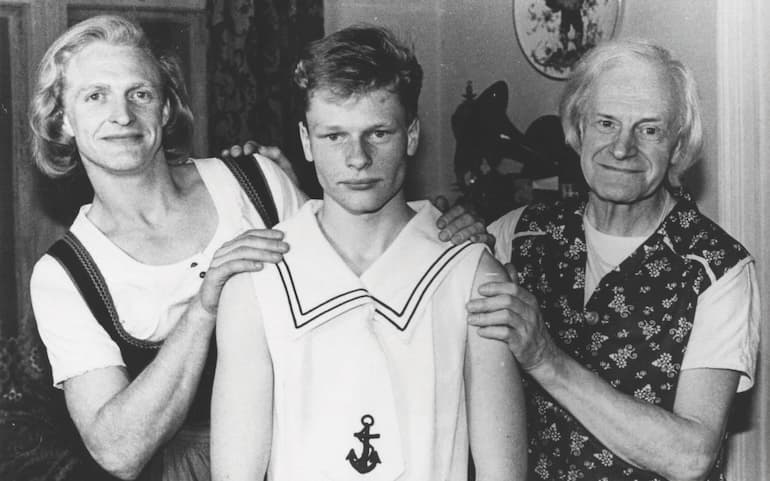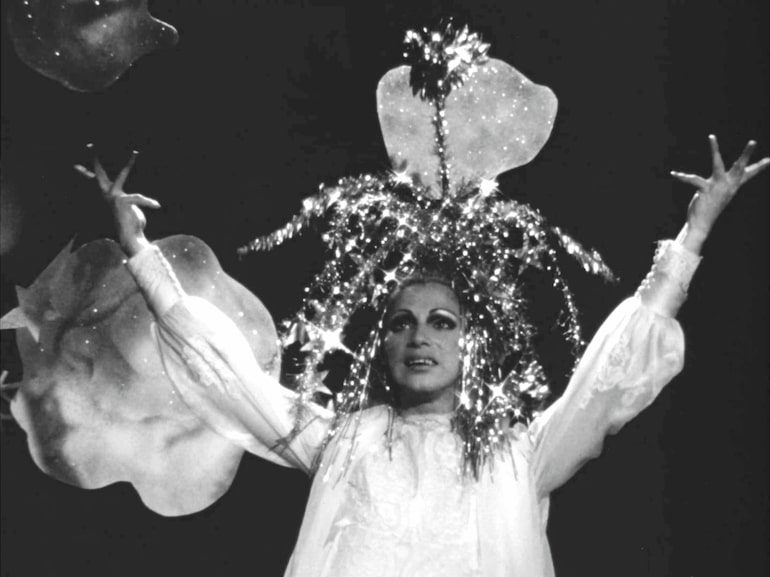FilmScene’s “Trans Narratives” series spans over five decades of film history, from overlooked queer classics to boundary-pushing experimental works.
These screenings, happening Tuesday evenings through June, invite viewers into a unique emotional and aesthetic space. They also range from incredible musical numbers to grueling personal reflections.
For trans audiences, especially those living in Iowa, these films may feel like anchors to the past, mirrors of the present, or provocations for the future. For everyone else, they’re a chance to witness the depth and complexity of stories often left untold. Here’s a look at each film:

I Am My Own Woman
I Am My Own Woman (above) tells the unbelievable story of Charlotte von Mahlsdorf through a unique fusion of documentary and biopic film techniques. This 1992 film has an aesthetic reminiscent of a PBS TV movie. But its narrative is incredibly inspiring, and it may be exactly what trans folk living in Iowa need right now.
Von Mahlsdorf is a transvestite that lived in Germany from 1928 to 2002. She plays herself in the modern day as the narrator of her own story, and also instructs actors on how to portray her younger self in recreating the most notable moments of her life.
One would imagine that the recounting of her experience surviving the horrors of Nazi Germany and a violent, abusive father would make for a rather bleak story. This tone is counterbalanced by moments of joy and self exploration in the welcoming spaces of her trans masculine “aunt” and accepting uncle. Both had accepted her trans identity from an early age.
In the film, we see Charlotte persevere through the oppressive occupation of East Berlin during her adult life. We also witness how she finds acceptance and community in the city’s underground queer scene.
The later years of her life depict her as a celebrated historian and public figure in Germany’s gay community. But the movie does not portray that “the bad times are over.”
Rather, it reminds us that while oppressive regimes come and go, community can be found by those brave and curious enough to look for it. The hate persists, yet so does Charlotte. Living a happy, fulfilling, adventurous life, she is her own woman.
The film’s budgetary restraints are immediately apparent, providing a cinematic experience that feels like a history class. But the story it tells — of a real-world trans icon — is inspiring, beautiful, and one that should be seen with friends. If the subtitles and soap opera lighting aren’t a deal breaker for you, then I encourage you to give this movie a chance.

Castration Movie
If I Am My Own Woman shows trans people at their best, then Castration Movie Anthology 1: Traps, screening June 17th, is a prime example of trans people at their messiest.
“Now this may strike some viewers as harsh,” the film opens, quoting comedian Norm Macdonald, “but I believe everyone in this story should die.”
If you go into Castration Movie unprepared, you will come away either sharing this sentiment, or feeling like it’s one of the most interesting movies you’ve ever seen.
It’s not a film done justice by a review; it’s more of a long-form artistic experience. Viewers will get out of this film what they put into it, but you’ll want to know a few facts before going in:
- The movie is four and a half hours long.
- It’s filmed on a low-resolution camera.
- The characters are intentionally unlikeable.
- Almost every scene is focused on immensely uncomfortable moments.
This film is an endurance test, not for the faint of heart or weak of bladder. With that said, every painful moment of this movie is charged with real emotion that will connect with anyone who’s been in an unhealthy relationship, or struggled with their self image.
The excessive run time allows these moments to breathe, accentuated with homemade music and poetry that pulls the viewer into the inner world of these characters.
As a trans person, I can’t say this film is going to win our community any fans. But I think most millennial trans viewers will find more than one scene that feels eerily similar to their own lived experience.
If you prefer your movies without loud experimental music, live readings of incel message boards, or long unglamorous depictions of sex work, then this one isn’t for you. It’s the only movie in this lineup that might be described as “By alt trans people, for alt trans people.”
But if you enjoy unique film experiences unlike anything you’ve seen before, then you will not be disappointed.
The film’s performances and editing skills make it clear that its “experimental” qualities are intentional. Some individual scenes are worthy of entire essays.
The film’s highlight is an extended scene featuring Vera Drew of The People’s Joker; it sold me on the film weeks before going in. The other 4 hours and 20 minutes did not disappoint, but no Letterboxd review can prepare any viewer for the experience.

North By Current
While Castration Movie Anthology shows trans folk at their lowest and most vulnerable moments, the last film of the month provides an introspective look at where we go from here. North By Current, screening June 24, shines a spotlight on the Midwest trans experience.
In this 2021 film, we see filmmaker Angelo Madsen Minax return to his hometown after a horrific family tragedy. Throughout its run time, North by Current blurs the line between true-crime documentary and personal-development video essay, weaving a tapestry of stories together through home movies and interviews with family members.
The opening of the film asks, “How’d you become who you became?” This acts as a thesis statement and a through-line connecting the rapidly changing focus of the film’s narrative.
The first half-hour sets the stage by laying out the facts surrounding the mysterious death of Angelo’s two-year-old niece. We see how the family was shaken by the criminal investigation, imprisonment, and eventual acquittal of Angelo’s brother-in-law, while increasingly complicated details are gradually revealed.
This gives the film an opportunity to explore the decades of family history that led up to this moment, the traumas that inform the family’s perspective, and the events that caused Angelo to put up emotional walls between himself and his immediate family.
The shift in focus towards Angelo’s family relationships is where many Midwestern trans folk will relate to too many painful moments. Many of us don’t know how to move forward when a loved one or family member responds to you coming out with the most hurtful thing you’ve ever heard. The latter half of this film focuses on the complicated process of repairing relationships after these emotional rifts have formed, and reconciling with one’s own failures and history of harm to those around them.
The film’s use of home videos and re-creations of traumatic moments can almost feel voyeuristic, as it explores every family’s worst nightmare. Almost everyone in this film, including our narrator, are shown at their absolute worst. Many viewers will be moved to tears as each tragic moment is re-examined; the vulnerable, flawed depictions of these characters makes them that much easier to understand.
This approach creates a space where we can see ourselves and our loved ones at our own worst moments, through the story on screen. We feel the same anguish and heartbreak these characters are going through.
North By Current is yet another film on this list that I would describe as “not for everyone.” Still, anyone in or related to the trans community in the Midwest should consider giving this one a look.
While its editing and visual imagery are incredible, it’s also a project that you can tell likely struggled to find its identity through the course of its creation. It’s not the kind of movie I’d recommend, or not — but it’s the most “seen” I felt out of all the “Trans Narrative” films.

Scarecrow in a Garden of Cucumbers
A fourth film kicked off this series last week and can be found on Youtube:
Scarecrow in a Garden of Cucumbers was thought to be “lost media” for almost 50 years, but it’s recently been recovered and restored by the Academy Film Archive.
It’s notable for being one of the first films to star a trans actress, Holly Woodlawn. It’s also notable because the main character’s gender identity is never mentioned in the film!
Scarecrow has surprising mainstream appeal for a film that stars drag performers and Andy Warhol-affiliated actors. I went in expecting something much more subversive and queer, along the lines of a John Waters film. Instead, I found a zany musical comedy that feels right at home with the other ’70s indie films and midnight movies one might catch at FilmScene.
Some scenes in this movie justify the price of admission all on their own. Every music number left me more emotionally invested in the characters of this film. Scarecrow even features a particularly touching vignette, with an original song by Bette Midler that I admit brought me to tears.
No two films on this list are alike, and each one offers an experience hard to find elsewhere in our current film landscape. Each one is absolutely worth examining. But casual filmgoers will enjoy themselves more if they don’t go into this experience blind.
FilmScene’s “Trans Narratives” series absolutely succeeds in its mission to explore the trans experience across generations, locations, and aesthetics. The series helps show where we came from and where we are now, while also providing some much needed perspective on where we go from here.
Find out more, including how to order tickets, here.

